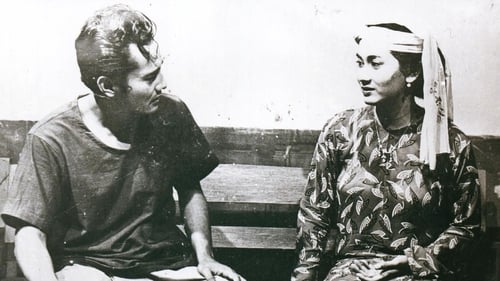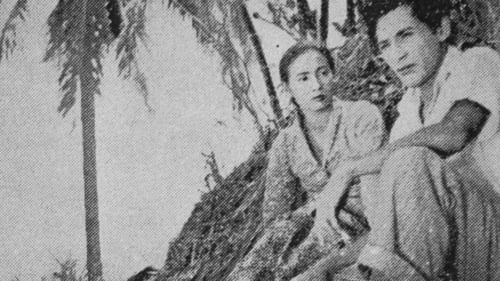
D. Djajakusuma
Birth : 1918-08-01, Temanggung
Death : 1987-10-28
History
Djadoeg Djajakusuma (1918–1987) was an Indonesian film director and promoter of traditional art forms. Born to a nobleman and his wife in Temanggung, Central Java, Djajakusuma became interested in the arts at a young age, choosing to pursue a career in theatre. During the Japanese occupation from 1943 to 1945 he was a translator and actor, and in the four-year national revolution which followed he worked for the military's educational division, several news agencies, and in drama.
In 1951, Djajakusuma joined the National Film Corporation (Perfini) at the invitation of Usmar Ismail. After making his directorial debut with Embun, Djajakusuma released a further eleven films with the company before leaving in 1964. He then returned to traditional Indonesian theatre, including wayang. Although he continued to direct movies independently of Perfini, most of his energies were dedicated to promoting traditional art forms and teaching cinematography. After over a decade of poor health and high blood pressure, Djajakusuma collapsed during a ceremony and died. He was buried in Karet Bivak Cemetery. The dedicated but easily angered Djajakusuma was influenced by Usmar Ismail's realist views, although he focused more on traditional aspects of life. His theatrical performances attempted to modernize traditional forms so that they could be better received in a modern world. He is credited with revitalising the Betawi theatre form lenong and received numerous awards for his filmmaking, including a lifetime achievement award at the Indonesian Film Festival.

Mr. Prawiro
The film tells the story of Fitria, the symbol of Indonesian women who are beautiful, subtle, humble, simple and very flexible in all respects. She always obeys her parents and her husband... and this is where all the problems arise as Fitria finds herself being maddened by what society expects her to be.

Producer
Parodying the TV police character Kojak, Leman, identifies himself with Kojak by his hat and lollipop, firmly stuck in his cheeks. He tries to help a woman by picking up a package that falls from her bag, and the package is filled with flour that he thinks is morphine. The woman turns out to be a flirtatious widow who wants to become a photo model. All the stories in the film are spoofs, and the suspected bandits reveal themselves as filmmakers.

Director

Director
The title “Hurricane and Storm”, is seemingly a translation from Sturm und Drang, a psychological term for puberty or a transition period for an individual's mental state. Kaslan is a conservative and honest bank clerk, while his wife, Miah, is more liberal in terms of discipline. Kaslan is strict with his daughters, Wati and Tina. It makes Wahab afraid to approach the girl of his dream, Wati, since Kaslan always escorts her wherever she goes. Wahab is also jealous by Wati's favourite English teacher and he tries to hang himself when she falls in love with a singer. When the singer rejects Wati, she returns to Wahab. Tina reveals all to her father but before he can scold her, she leaves the house, and returns home only much later. But mother explains about the puberty that Wati is going through. In turn, Wahab also learns to understand Kaslan's reason for his strictness. Then they both graduate from high school.

Writer
Pracuna rules the Kingdom of Pringgodani, and is so powerful that he demands a goddess from nirvana named Dewi Supraba to be his wife. The gods have no choice but to agree to his request. Supraba then comes down to Pringgodani to trick Pracuna. When Pracuna realizes this, he is furious and threatens to invade nirvana. The gods need to find a new champion and they nominate Gatotkaca, the son of Bima (of the Pandawa clan), whose mother is Arimbi, Pracuna’s daughter.

Director
Pracuna rules the Kingdom of Pringgodani, and is so powerful that he demands a goddess from nirvana named Dewi Supraba to be his wife. The gods have no choice but to agree to his request. Supraba then comes down to Pringgodani to trick Pracuna. When Pracuna realizes this, he is furious and threatens to invade nirvana. The gods need to find a new champion and they nominate Gatotkaca, the son of Bima (of the Pandawa clan), whose mother is Arimbi, Pracuna’s daughter.

Writer
Mr. Prawiro, a retired (district chief) assistant, lives in Kebumen village, his hometown. His eldest daughter, Indrani, marries Sumantri, a staff in “Bank Tabungan Pos”. In a meeting, Mr Prawiro suggests that the importance for saving money needs to be stressed.

Director
Mr. Prawiro, a retired (district chief) assistant, lives in Kebumen village, his hometown. His eldest daughter, Indrani, marries Sumantri, a staff in “Bank Tabungan Pos”. In a meeting, Mr Prawiro suggests that the importance for saving money needs to be stressed.

Director
Suro becomes obsessed with Ujung as a tool to take power over the village. His ambition stumbles when his daughter, Marni, falls in love with Kasan, an ordinary peasant from the same village.

Screenplay
Set in the 1930s, and narrated like a ballad from the past, "The Tiger from Tjampa" tells of how a young man, Lukman, seeks to avenge his father’s murder by learning pencak silat, a traditional form of self defence, based on the movements of animals.

Director
Set in the 1930s, and narrated like a ballad from the past, "The Tiger from Tjampa" tells of how a young man, Lukman, seeks to avenge his father’s murder by learning pencak silat, a traditional form of self defence, based on the movements of animals.

Director
Iskandar is a talented clarinet player who trains under an old musician named Sobari. He also has moral support from his girlfriend. But when he becomes successful, he forgets about Sobari, his friends and his girlfriend. Only when his career crumbles does Iskandar remember again his girlfriend and friends.

Writer
After the revolutionary war, Leman is asked by Barjo to join him in collecting donations from businessmen. Some donate while others do not. But Leman gets into a fight with one particular man who refuses to donate and kills him.

Director
After the revolutionary war, Leman is asked by Barjo to join him in collecting donations from businessmen. Some donate while others do not. But Leman gets into a fight with one particular man who refuses to donate and kills him.

Writer
An unexpected encounter between an estranged father with his former family that he had left for another woman.



